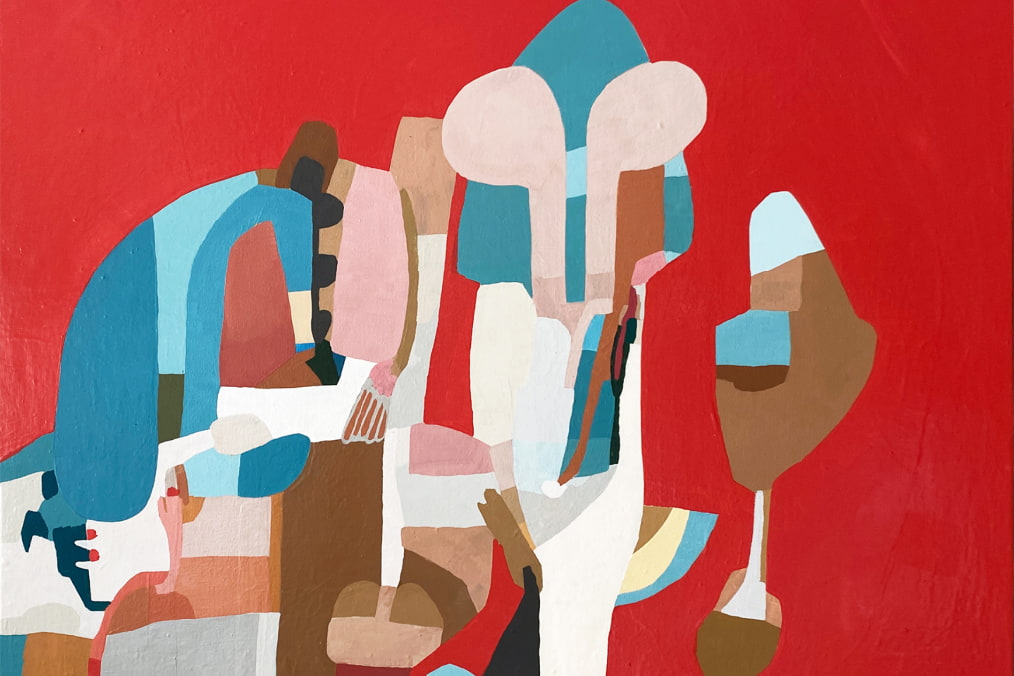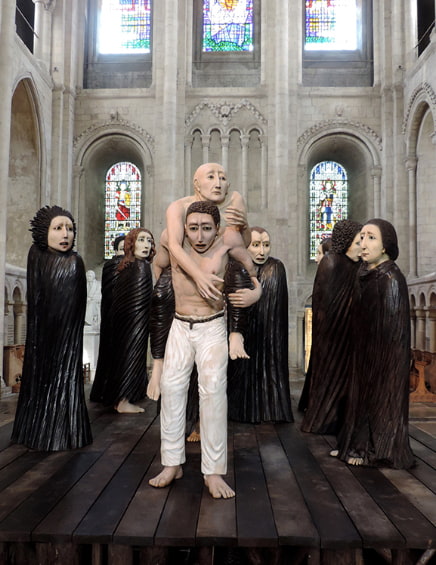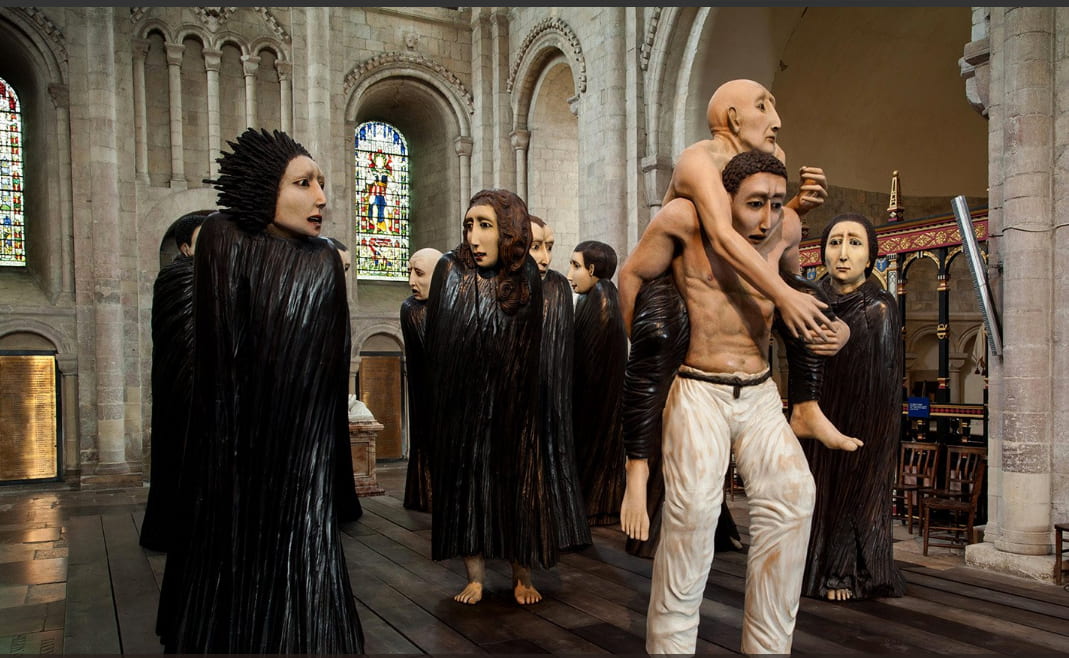March 5: Love in Action
♫ Music:
Day 21 - Tuesday, March 05
Title: LOVE IN ACTION
Scripture #1: Galatians 6:1-5 (NKJV)
Brethren, if a man is overtaken in any trespass, you who are spiritual restore such a one in a spirit of gentleness, considering yourself lest you also be tempted. Bear one another’s burdens, and so fulfill the law of Christ. For if anyone thinks himself to be something, when he is nothing, he deceives himself. But let each one examine his own work, and then he will have rejoicing in himself alone, and not in another. For each one shall bear his own load.
Scripture #2: Romans 12:9-16, Romans 13:8-10 (NKJV)
Let love be without hypocrisy. Abhor what is evil. Cling to what is good. Be kindly affectionate to one another with brotherly love, in honor giving preference to one another; not lagging in diligence, fervent in spirit, serving the Lord; rejoicing in hope, patient in tribulation, continuing steadfastly in prayer; distributing to the needs of the saints, given to hospitality. Bless those who persecute you; bless and do not curse. Rejoice with those who rejoice, and weep with those who weep. Be of the same mind toward one another. Do not set your mind on high things, but associate with the humble. Do not be wise in your own opinion. Owe no one anything except to love one another, for he who loves another has fulfilled the law. For the commandments, “You shall not commit adultery,” “You shall not murder,” “You shall not steal,” “You shall not bear false witness,” “You shall not covet,” and if there is any other commandment, are all summed up in this saying, namely, “You shall love your neighbor as yourself.” Love does no harm to a neighbor; therefore love is the fulfillment of the law.
Poetry & Poet:
“Law Like Love”
by W.H. Auden
Law, say the gardeners, is the sun,
Law is the one
All gardeners obey
Tomorrow, yesterday, today.
Law is the wisdom of the old,
The impotent grandfathers feebly scold;
The grandchildren put out a treble tongue,
Law is the senses of the young.
Law, says the priest with a priestly look,
Expounding to an unpriestly people,
Law is the words in my priestly book
Law is my pulpit and my steeple.
Law, says the judge as he looks down his nose,
Speaking clearly and most severely,
Law is as I've told you before,
Law is but let me explain it once more,
Law is The Law.
Yet law-abiding scholars write:
Law is neither wrong nor right,
Law is only crimes
Punished by places and by times,
Law is the clothes men wear
Anytime, anywhere.
Law is Good-morning and Good-night.
Others say, Law is our Fate;
Others say, Law is our State;
Others say, others say
Law is no more.
Law has gone away.
And always the loud angry crowd,
Very angry and very loud,
Law is We,
And always the soft idiot softly Me.
If we, dear, know we know no more
Than they about the Law,
If I no more than you
Know what we should and should not do
Except that all agree
Gladly or miserably
That the Law is
And that all know this,
If therefore thinking it absurd
To identify Law with some other word,
Unlike so many men
I cannot saw Law is again
No more than they can we suppress
The universal wish to guess
Or slip out of our own position
Into an unconcerned condition.
Although I can at least confine
Your vanity and mine
To stating timidly
A timid similarity,
We shall boast anyway:
Like Love I say.
Like love we don't know where or why,
Like love we can't compel or fly,
Like love we often weep.
Like love we seldom keep.
LOVE IN ACTION
Individualism is a core value of American culture. In this country, a central goal of parenting is to raise children to become independent and self-sufficient adults. The underlying assumption for this reality and cultural practice is the belief that each of us has the agency and responsibility to look for our own interests without becoming a burden to others. Yes, we live in a community and need each other, but we should not depend on each other.
Nevertheless, the biblical idea of community differs from our cultural understanding and values. Even though individuality is essential, as each of us is created in the image of the Triune God, our existence is determined by our interdependence. As the body of Christ, the Church is the most remarkable example of this reality that exemplifies the connection between what some theologians call “the one and the many,” or the relationships between our individuality and our community based on our image of God’s identity. In Christ, we are members of one body. Yes, we are individuals, but our community, the body of Christ, defines us. We cannot live or grow in our relationship with God in isolation. We need each other; we depend on each other as members of only one body.
How shall we live as a community without losing our individual agency? Love is the answer. We can love one another because God first loved us. Loving God and loving one another as God loves us is the fulfillment of the law and the statement that summarizes the purpose of our existence. Our love for one another also represents the greatest testimony of our faith in Christ:
“By this, everyone will know that you are my disciples, if you love one another,” (John 13:35). Love is not an option; it’s the only way.
But love is practical. One of our Scripture passages today (Romans 12) provides a list of specific actions that we all must take as followers of Christ: “Be kindly affectionate to one another with brotherly love, in honor giving preference to one another…distributing to the needs of the saints, given to hospitality. Bless those who persecute you; bless and do not curse. Rejoice with those who rejoice, and weep with those who weep. Be of the same mind toward one another…” The Christian life could be summarized as love in action.
Love becomes a reality when we move from self-interest, self-sufficiency, and self-serving to mutual interest, mutual dependence, and mutual serving. Can you imagine how different our communities would be if we constantly looked for the interests of others instead of ours? But we can only love those we know and can only know them if we are close to them. Distance only brings suspicion and indifference, while closeness brings empathy. How close are we to those who are different from us? We have the example of Jesus Christ, who became a human being for us even though he was different and better. Easter is more than a past event––the cross and resurrection are the way to live as a loving community that reflects the love of God to everybody.
Prayer
Our Father, the open arms of Jesus at the cross visually represent how vast your love for us is. We receive your unconditional love and grace with gratitude and humility. Your love compels us to love others as you have loved us. We need your Spirit, and we always need one another. May our actions always reflect Christ to everybody.
Dr. Octavio Javier Esqueda
Professor of Christian Higher Education
Director, Ph.D. and Ed.D. Programs in Educational Studies
Talbot School of Theology
Biola University
For more information about the artwork, music, and poetry selected for this day, we have provided resources under the “About” tab located next to the “Devotional” tab.
About the Art #1:
Samaritan
Jen Wink Hays
2021
Oil on canvas
30 x 36 in.
About the Artist #1:
Jen Wink Hays (b. 1972) is an American artist who studied art at Barnard College in New York City. The contrast and interplay between natural and man-made environments is an ongoing inspiration in her work. Her paintings playfully walk the line between abstraction and representation, complexity and simplicity, through a deliberate quest to innovate with color and form. Hays’ paintings revel in the beauty of imperfection and examine the kinetic quality of systems and networks where individual elements have a complex relationship to the whole. These explorations take on many forms in her work, ranging from tightly energized planes of geometric forms to lush oil paintings where rich opaque fields interact with small outlier sections of color. Hays has exhibited her work in various New York institutions and her paintings are part of private collections across the United States. In addition to her fine art practice, Hays is the co-founder of the Blue School in Lower Manhattan and the founder of the NYC design studio Utility Design. Her work in design has been recognized with an Ace Award, an SPD editorial design award, and recognition in numerous design anthologies and periodicals.
https://www.artsy.net/artwork/jen-wink-hays-samoset
About the Art #2:
Shadows of the Wanderer (Installation)
Ana Maria Pacheco
2008
Polychrome wood from a lime tree, onyx, acrylic, nails
Steel and wood base
260 x 390 x 605 cm
Chichester Cathedral, UK
While working on a previous sculpture, sculptor Ana Maria Pacheco recounts how an image came into her mind of a young man carrying an old man on his shoulders. She recalled scenes in Virgil’s Aeneid in which the Trojan prince Aeneas leads a band of refugees from the ruins of Troy, while carrying his father on his back. This, together with daily media images of contemporary suffering, led to the creation of the two front figures sculpted from one block of wood. Ten larger-than-life-size presences—like a chorus from Greek theatre—observe the men’s plight with a variety of emotions. The forward movement of the piece, conveyed by the young man’s dogged advance and the old man’s gaze into the distance, creates a sense that the two protagonists are about to leave their world and enter ours, while yet another realm is suggested by the shadowy space beneath the stage.
—adapted from Robert Bush
https://www.meer.com/en/21420-shadows-of-the-wanderer
https://talkingbeautifulstuff.com/2015/04/14/ana-maria-pacheco-in-norwich/
https://prattcontemporaryart.co.uk/work/shadows-of-the-wanderer/
About the Artist #2:
Ana Maria Pacheco (b. 1943) is a Brazilian sculptor, painter, and printmaker. Her work is influenced by her Brazilian heritage and often focuses on supernatural themes, incorporating them into unfolding narratives within her work. Pacheco's work has been displayed in galleries internationally and has won multiple awards throughout her career. While living in Brazil, she studied sculpture and music at the Pontifical Catholic University of Goiás and the Federal University of Goiás. She subsequently completed postgraduate coursework in music and education at the Federal University of Brazil in Rio de Janeiro, Brazil. She later taught and lectured at these institutions before moving to London in 1973 to study at the Slade School of Art.. Between 1985 and 1989, Pacheco was the first woman head of fine art at the Norwich School of Art in the UK. Pacheco's work commonly focuses on travel, often with themes exploring fantasy and the supernatural, and often includes Brazilian legends, mythology, Christian mysticism, and medieval satire.
https://en.wikipedia.org/wiki/Ana_Maria_Pacheco
About the Music:
“Bear Ye One Another’s Burdens” from the album Live for You
Lyrics:
Bear ye one another’s burdens.
Bear ye one another’s burdens.
Won't you bear ye one another’s burdens.
So fulfill the law of the Lord.
When problems arise that are
Too much to face alone.
Look around you and find the hand of a friend.
And hold on.
Bear ye one another’s burdens.
Bear ye one another’s burdens.
Won't you bear ye one another’s burdens.
So fulfill the law of the Lord.
There are times we know
When life itself can weigh us down.
But with the help of a friend
A way to lift the Lord can be found
That’s why he sends
Special ones into our way
To show us His love
And build us up
So we can say.
Bear ye one another’s burdens.
Bear ye one another’s burdens.
Won't you bear ye one another’s burdens.
So fulfill the law of the Lord.
About the Composer/Performer:
Maura McIntosh is an American singer-songwriter living in Memphis, Tennessee. She graduated from Millsaps College in Jackson, Mississippi, with a B.A. in music (1976).
https://www.linkedin.com/in/maura-mcintosh-328831b9
About the Poetry and Poet:
W. H. Auden (1907–1973) was an English poet, playwright, critic, and librettist who exerted a major influence on the poetry of the twentieth century. Well-known for his extraordinary intellect and wit, his first book, Poems, was published in 1930 with the help of T. S. Eliot. Just before WWII, Auden emigrated to the United States. Auden won the Pulitzer Prize in 1948 for The Age of Anxiety. Much of his poetry is concerned with moral issues and evidences a strong political, social, and psychological context. Auden published about four hundred poems, including seven long poems (two of them book-length). His poetry was encyclopedic in scope and method, ranging in style from obscure twentieth-century modernism to lucid traditional forms such as ballads and limericks. Today, he is considered one of the most skilled and creative mid-twentieth-century poets who regularly wrote in traditional rhyme and meter.
https://www.poetryfoundation.org/poets/w-h-auden
About the Devotion Writer:
Dr. Octavio Javier Esqueda
Professor of Christian Higher Education
Director, Ph.D. and Ed.D. Programs in Educational Studies
Talbot School of Theology
Biola University
Dr. Octavio Javier Esqueda is a professor of Christian higher education in the doctoral programs at Talbot School of Theology at Biola University. He was born and raised in Guadalajara, México, where he graduated with honors with a Licenciatura in Latin American Literature from the University of Guadalajara, as well as two additional diplomas, one in religion and society and the second in journalism. He graduated with honors from Dallas Theological Seminary with an M.A. in Christian Education and completed his Ph.D. in Higher Education at the University of North Texas. Before coming to Biola University, he taught at Southwestern Baptist Theological Seminary in Fort Worth, Texas. He and his wife, Angélica, have two children, Darío and Salma. Dr. Esqueda has several publications on theological education, Christian higher education, and literature. Teaching is his passion and he has had the opportunity to teach in several countries on different academic levels. He is an avid soccer fan.


